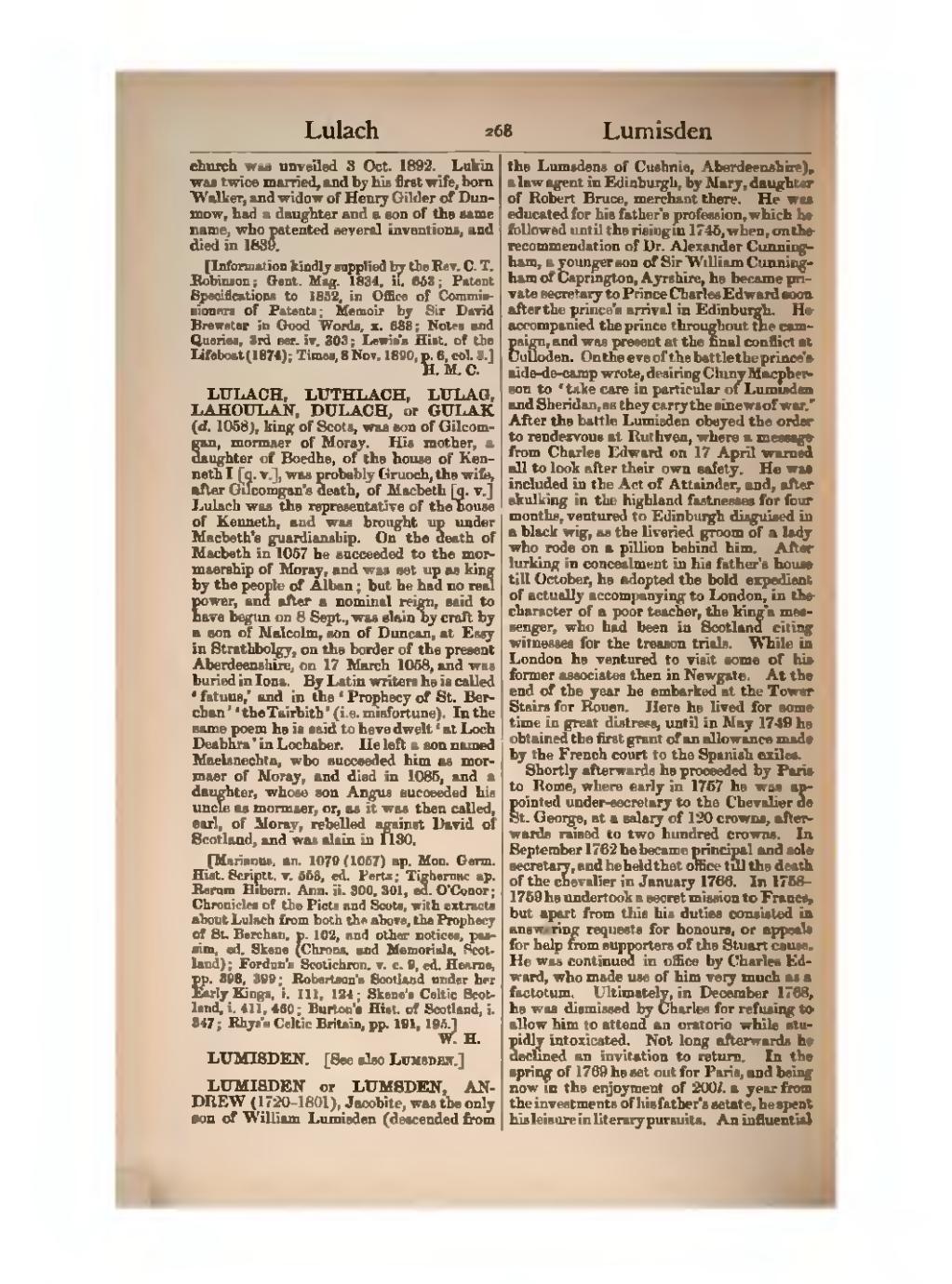church was unveiled 3 Oct. 1892. Lukin was twice married, and by his first wife, born Walker, and widow of Henry Gilder of Dunmow, had a daughter and a son of the same name, who patented several inventions, and died in 1839.
[Information kindly supplied by the Rev. C. T. Robinson; Gent. Mag. 1834, ii. 653; Patent Specifications to 1852, in Office of Commissioners of Patents; Memoir by Sir David Brewster in Good Words, x. 688; Notes and Queries, 3rd ser. iv. 303; Lewis's Hist. of the Lifeboat (1874); Times, 8 Nov. 1890, p. 6, col. 3.]
LULACH, LUTHLACH, LULAG, LAHOULAN, DULACH, or GULAK (d. 1058), king of Scots, was son of Gilcomgan, mormaer of Moray. His mother, a daughter of Boedhe, of the house of Kenneth I [q. v.], was probably Gruoch, the wife, after Gilcomgan's death, of Macbeth [q. v.] Lulach was the representative of the house of Kenneth, and was brought up under Macbeth's guardianship. On the death of Macbeth in 1057 he succeeded to the mormaership of Moray, and was set up as king by the people of Alban; but he had no real power, and after a nominal reign, said to have begun on 8 Sept., was slain by craft by a son of Malcolm, son of Duncan, at Essy in Strathbolgy, on the border of the present Aberdeenshire, on 17 March 1058, and was buried in Iona. By Latin writers he is called ‘fatuus,’ and in the ‘Prophecy of St. Berchan’ ‘the Tairbith’ (i.e. misfortune). In the same poem he is said to have dwelt ‘at Loch Deabhra’ in Lochaber. He left a son named Maelsnechta, who succeeded him as mormaer of Moray, and died in 1085, and a daughter, whose son Angus succeeded his uncle as mormaer, or, as it was then called, earl, of Moray, rebelled against David of Scotland, and was slain in 1130.
[Marianus, an. 1079 (1057) ap. Mon. Germ. Hist. Scriptt. v. 558, ed. Pertz; Tighernac ap. Rerum Hibern. Ann. ii. 300, 301, ed. O'Conor; Chronicles of the Picts and Scots, with extracts about Lulach from both the above, the Prophecy of St. Berchan, p. 102, and other notices, passim, ed. Skene (Chrons. and Memorials, Scotland); Fordun's Scotichron. v. c. 9, ed. Hearne, pp. 398, 399; Robertson's Scotland under her Early Kings, i. 111, 124; Skene's Celtic Scotland, i. 411, 460; Burton's Hist. of Scotland, i. 347; Rhys's Celtic Britain, pp. 191, 195.]
LUMISDEN. [See also Lumsden.]
LUMISDEN or LUMSDEN, ANDREW (1720–1801), Jacobite, was the only son of William Lumisden (descended from the Lumsdens of Cushnie, Aberdeenshire), a law agent in Edinburgh, by Mary, daughter of Robert Bruce, merchant there. He was educated for his father's profession, which he followed until the rising in 1745, when, on the recommendation of Dr. Alexander Cunningham, a younger son of Sir William Cunningham of Caprington, Ayrshire, he became private secretary to Prince Charles Edward soon after the prince's arrival in Edinburgh. He accompanied the prince throughout the campaign, and was present at the final conflict at Culloden. On the eve of the battle the prince's aide-de-camp wrote, desiring Cluny Macpherson to ‘take care in particular of Lumisden and Sheridan, as they carry the sinews of war.’ After the battle Lumisden obeyed the order to rendezvous at Ruthven, where a message from Charles Edward on 17 April warned all to look after their own safety. He was included in the Act of Attainder, and, after skulking in the highland fastnesses for four months, ventured to Edinburgh disguised in a black wig, as the liveried groom of a lady who rode on a pillion behind him. After lurking in concealment in his father's house till October, he adopted the bold expedient of actually accompanying to London, in the character of a poor teacher, the king's messenger, who had been in Scotland citing witnesses for the treason trials. While in London he ventured to visit some of his former associates then in Newgate. At the end of the year he embarked at the Tower Stairs for Rouen. Here he lived for some time in great distress, until in May 1749 he obtained the first grant of an allowance made by the French court to the Spanish exiles.
Shortly afterwards he proceeded by Paris to Rome, where early in 1757 he was appointed under-secretary to the Chevalier de St. George, at a salary of 120 crowns, afterwards raised to two hundred crowns. In September 1762 he became principal and sole secretary, and he held that office till the death of the chevalier in January 1766. In 1758–1759 he undertook a secret mission to France, but apart from this his duties consisted in answering requests for honours, or appeals for help from supporters of the Stuart cause. He was continued in office by Charles Edward, who made use of him very much as a factotum. Ultimately, in December 1768, he was dismissed by Charles for refusing to allow him to attend an oratorio while stupidly intoxicated. Not long afterwards he declined an invitation to return. In the spring of 1769 he set out for Paris, and being now in the enjoyment of 200l. a year from the investments of his father's estate, he spent his leisure in literary pursuits. An influential
